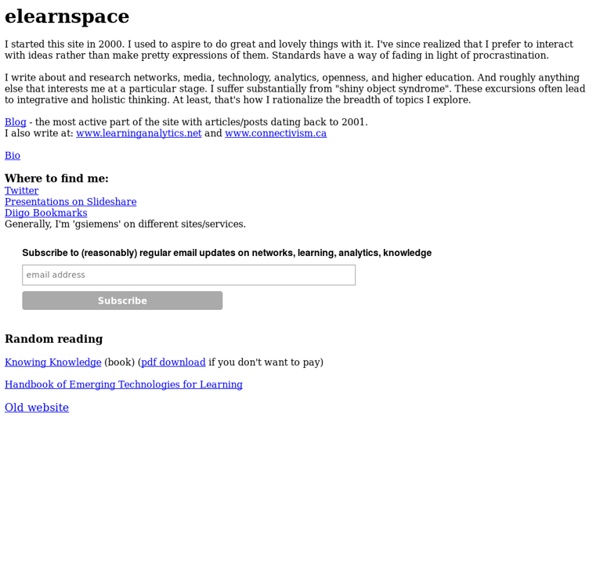



Nov. 1998: "It takes a whole village to raise a child." - Igbo and Yoruba (Nigeria) Proverb African Proverb of the Month November, 1998 It takes a whole village to raise a child. Igbo and Yoruba (Nigeria) Proverb Explanation: An Introduction to Connective Knowledge ~ Stephen's Web ~ b You are not logged in. [] [] Revised and Updated (minor corrections and typos only) and placed in MS-Word Document form, November 27, 2007. Click here . The version that follows below is the original (uncorrected) version). Yet another article, describing new forms of knowledge as probablistic , has crossed my desk today, and consequently it seems appropriate at this time to type a few words on the nature of distributed knowledge.
MOOCs prompt some faculty members to refresh teaching styles CAMBRIDGE, Mass. -- Amid the various influences that massive open online courses have had on higher education in their short life so far -- the topic of a daylong conference here Monday -- this may be among the more unexpected: The courses may be prompting some faculty to pay more attention to their teaching styles than they ever have before. The conference, organized Monday in Cambridge by Harvard University and the Massachusetts Institute of Technology, featured academics and administrators from elite North American universities and other players in the world of MOOCs discussing the rise of online courses and the future of residential colleges and universities. The new attention to teaching methods and learning sciences is coming from two directions: faculty who want to make sure their teaching is up to snuff for a wider audience, and technology that allows new levels of interaction with students, and new understanding of students' strengths and weaknesses.
How to Create a Robust and Meaningful Personal Learning Network [PLN] This post describes how educators can develop a personal learning network that supports meaningful and relevant learning. The MOOC, Education Technology & Media, etmooc, is used here as a working example of how to develop a PLN. “My Personal Learning Network is the key to keeping me up-to-date with all the changes that are happening in education and how technology can best support and engage today’s students.” Brian Metcalfe: teacher, blogger at lifelonglearners.com Teaching Tips From a Master MOOC-Maker Teach a MOOC … what are you, crazy? … However, what I learned was that teaching a MOOC has been the purest and most fun form of teaching and learning that I’ve ever done. Maria H. Andersen, Ph.D. (Canvas Network, Sloan Consortium Streamed Session, April 9, 2013)
The Top 100 Tools for Learning 2012 list is revealed UPDATE: The Top100Tools Club opening January This year’s Top 100 Tools for Learning list (the 6th Annual Survey) has been compiled from the votes of 582 learning professionals worldwide – 55% working in education, 45% working in non-educational organizations. The top tool for the 4th year running is Twitter, with both YouTube (2nd) and Google Docs (aka Google Drive) (3rd) retaining their places for the 3rd year in succession. Once again the list is dominated by free online social tools.
My Open Learning: cMOOCs Current 1) Open Online Experience 2013Overview: This year-long professional development course is open to anyone, and focuses on education technology for K- 16. It provides a rich, immersive experience into the study and use of educational technology in teaching and learning, and is designed on the “connectivist” model. For a brief definition of “connectivism,” click here. Metaknowledge Metaknowledge or meta-knowledge is knowledge about a preselected knowledge. For the reason of different definitions of knowledge in the subject matter literature, meta-information is or is not included in meta-knowledge. Detailed cognitive, systemic and epistemic study of human knowledge requires a distinguishing of these concepts. but in the common language knowledge includes information, and, for example, bibliographic data are considered as a meta-knowledge. Metaknowledge may be automatically harvested from electronic publication archives, to reveal patterns in research, relationships between researchers and institutions and to identify contradictory results.[2]
My Open Learning: xMOOCs I participate frequently in MOOCs, both xMOOCs such as those offered through platforms edX and Coursera, and cMOOCs. cMOOCs offer a different learning experience; usually less structured where learning relies upon networked interactions using social media platforms. Click here for reviews on my completed cMOOCs. To read an in-depth article describing differences between the two types of MOOCs click here. I participate in MOOCs for different reasons that depend upon my learning goals and the amount of time I am able to commit to the course during its time frame. I categorize my participation as follows: Online Education and the Virtual Classroom Sometimes the best inventions happen by accident. One of the world's great storehouses of biological knowledge is the Animal Diversity Web. In 1995, University of Michigan biology professor Philip Myers decided to use the new medium of the World Wide Web to engage his students in producing the textbook he thought his course needed but did not exist. The tasks of researching, writing, checking, and posting information about animal species and their habitats could, Myers reasoned, not only teach students about animal diversity but also help them better understand the science involved.